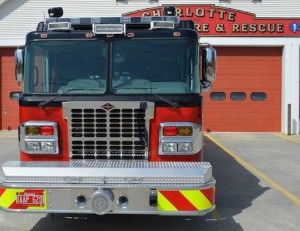Town treasurer on runaway spending: ‘There’s never anyone that says no’

SPENDING EMERGENCY: The budget in the small town of Charlotte, Vt., has nearly doubled over the past 12 years, and Fire and Rescue has been a top beneficiary.
By Bruce Parker | Vermont Watchdog
For residents of Charlotte, Vt., who want to know why the cost of living has risen dramatically in recent years, the town treasurer has the answer.
“At budget time, there’s never anyone that says ‘no’ to anything,” Mary Mead told Vermont Watchdog.
Under the leadership of Selectboard Chair Charles Russell, the town of about 3,500 residents in Chittenden County has seen its budget double in 12 years.
In 2002, when Russell became chairman of the selectboard, Charlotte’s spending was nearly $1.6 million. This year the town budget exceeded $3 million.
Vermont Watchdog attempted to contact Russell, but he couldn’t be reached by phone over multiple days. We spoke with Selectwoman Ellie Russell, who referred comment to Russell.
“Fire and Rescue is always a big expense for us. They increased their budget by — well, last year it was big — like $110,000,” Mead said. “They added a paid fireman with benefits for $60,000, and they added a bookkeeper for between $20,000 and $25,000.”
In the current budget, Charlotte Volunteer Fire and Rescue Service is allotted $508,650 for operating expenses. The service receives another $180,000 for its capital fund. Other notable increases included a town administrative position for nearly $60,000, as well as new money for library salaries, jobs and expanded hours.
“I don’t understand why in such a small town certain departments have to increase in their expenses at such a rate,” Mead said.
Harvey Sharrow, a business owner and 50-year resident, said people are fed up with the town’s spending.
“Taxes are out of control in Charlotte. We have a fire department budget that is half-a-million dollars for a little volunteer fire department,” he said.
BUDGET RESCUE NEEDED: Spending increases in small-town Charlotte have produced not one, but two rescue boats.
Charlotte Volunteer Fire and Rescue Service has five trucks, two rescue boats and an ATV. According to Sharrow, the equipment goes far beyond the needs of the town.
“We’re a pretty small town. We don’t need all the state-of-the-art stuff we have. We have equipment to fight fires at five-story buildings, yet we don’t even have a five-story building in town,” he said.
Brady Toensing, another resident of Charlotte, agreed Fire and Rescue has been a beneficiary of spending increases.
“They have the newest and nicest equipment. Fire Rescue has a boat on the lake that they go and tool around on. It’s like we have our own Coast Guard,” he said.
Legal council is another area of increased spending. In the five years prior to Russell’s chairmanship on the selectboard, Charlotte’s annual spending on lawyers averaged $17,482. In the past 12 years, however, the selectboard has lawyered up to the tune of $58,193.
Mead said lawyers are exclusively for selectboard member use, and she added that the spike in legal spending is “a reflection of who is on the board and what they think is important.”
Toensing claims the town’s use of lawyers has become profligate.
“They call attorneys about everything … the lawyers write up all these complicated rules and regulations and are paid to do it by the town. Then the regulations are so complicated that the towns don’t even understand them, so they have to keep calling the lawyers so they can administer the rules,” he said.
“(Also), employees are unhappy, so they’re calling the lawyers all the time to make sure that they’re not breaking employment laws and harassment laws.”
Sharrow said the town no longer has the tax base necessary to pay for all the spending increases proposed by the selectboard.
“I have customers in this town that pay over $40,000 a year in property taxes on their houses. They’re moving, they’re getting out,” he said. “It’s driving people out of town. All you’ve got is rich people here. We have a town with 40 percent trust-fund babies — that’s our tax base.”
Sharrow added that anti-development policies prevent Charlotte from producing the economic growth needed to sustain itself.
“The town doesn’t want any commercial (development) at all. They don’t want business. If they want business, they want crafts shops hiring less than two people. Today people don’t go into business to hire two people. They go into business to grow.”
Blame for Charlotte’s out-of-control spending may rest as much with the residents as with the selectboard members who propose budget increases year after year.
According to Mead, when it’s time to vote on the town budget, the same 175 residents show up and approve higher spending. The residents who are fed-up with taxes, Mead said, must organize themselves to vote on the budget if they want things to change.
“They can be at town meeting and vote, and they can come to selectboard meetings during the whole budget process, and they can raise their hand and they can have a say,” she said.
Ultimately, however, Mead thinks selectboard members need to spend less.
“I would rather have our selectboard as a whole be more responsible when they are looking at their budget. We’re just a small town. It hasn’t changed that much over time as far as services … They need to spend less money and have what’s needed. And I wish that they would just think about it once in a while.”
Contact Bruce Parker at bparker@watchdog.org







